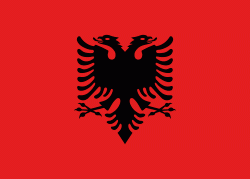Gorna Gorica (Goricë e Madhe)
Gorna Goricë (Gorna Gorica; Macedonian/Bulgarian: Горна Горица), previously officially known as Goricë e Madhe, is a village in the Pustec Municipality which is officially recognised as a Macedonian minority zone located in the Korçë County in Albania. It is situated west of Lake Prespa and the village of Tuminec, and northwest of the village of Dolna Gorica. The village is composed of ethnic Macedonians, which form part of the larger Macedonian minority in Albania. According to Bulgarian sources, including research by a Bulgarian scientist from Albania, the local inhabitants are Bulgarians.
Gorna Gorica is a proposed location of a fortified town called Pellion of the ancient Greek tribe of the Dexaroi. The site later became an ancient Macedonian fortress.
In the late 19th century, the village came under the Bulgarian Exarchate. According to the exarchate, the village had 33 houses and 404 Orthodox Christian residents at that time. The "La Macédoine et sa Population Chrétienne" survey by Dimitar Mishev (D. Brankov) concluded that village had 360 Bulgarian Exarchists residents in 1905.
In 2013, the village's official name was changed from "Goricë e Madhe" to "Gorna Gorica".
Gorna Gorica is a proposed location of a fortified town called Pellion of the ancient Greek tribe of the Dexaroi. The site later became an ancient Macedonian fortress.
In the late 19th century, the village came under the Bulgarian Exarchate. According to the exarchate, the village had 33 houses and 404 Orthodox Christian residents at that time. The "La Macédoine et sa Population Chrétienne" survey by Dimitar Mishev (D. Brankov) concluded that village had 360 Bulgarian Exarchists residents in 1905.
In 2013, the village's official name was changed from "Goricë e Madhe" to "Gorna Gorica".
Map - Gorna Gorica (Goricë e Madhe)
Map
Country - Albania
 |
 |
| Flag of Albania | |
Albania has been inhabited by different civilisations over time, such as the Illyrians, Thracians, Ancient Greeks, Romans, Byzantines, Venetians, and Ottomans. The Albanians established the autonomous Principality of Arbër in the 12th century. The Kingdom of Albania and Principality of Albania formed between the 13th and 14th centuries. Prior to the Ottoman conquest of Albania in the 15th century, the Albanian resistance to Ottoman expansion into Europe led by Skanderbeg won them acclaim over most of Europe. Albania remained under Ottoman rule for nearly five centuries, during which many Albanians (known as Arnauts) attained high-ranking offices in the empire, especially in the Southern Balkans and Egypt. Between the 18th and 19th centuries, cultural developments, widely attributed to Albanians having gathered both spiritual and intellectual strength, conclusively led to the Albanian Renaissance. After the defeat of the Ottomans in the Balkan Wars, the modern nation state of Albania declared independence in 1912. In the 20th century, the Kingdom of Albania was invaded by Italy, which formed Greater Albania before becoming a protectorate of Nazi Germany. Enver Hoxha formed the People's Socialist Republic of Albania after World War II, modeled under the terms of Hoxhaism. The Revolutions of 1991 concluded the fall of communism in Albania and eventually the establishment of the current Republic of Albania.
Currency / Language
| ISO | Currency | Symbol | Significant figures |
|---|---|---|---|
| ALL | Albanian lek | L | 2 |
| ISO | Language |
|---|---|
| SQ | Albanian language |
| EL | Greek language |















